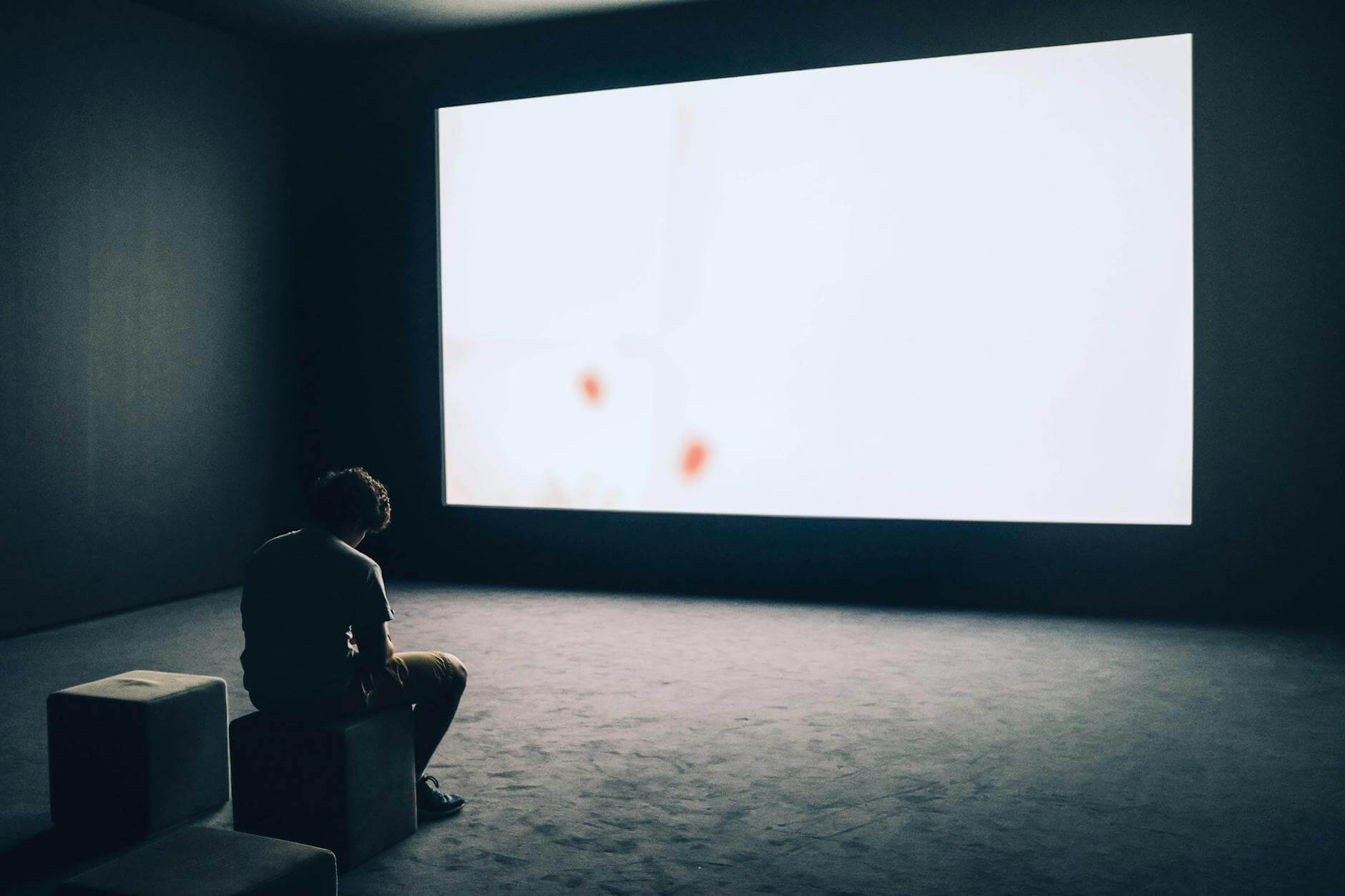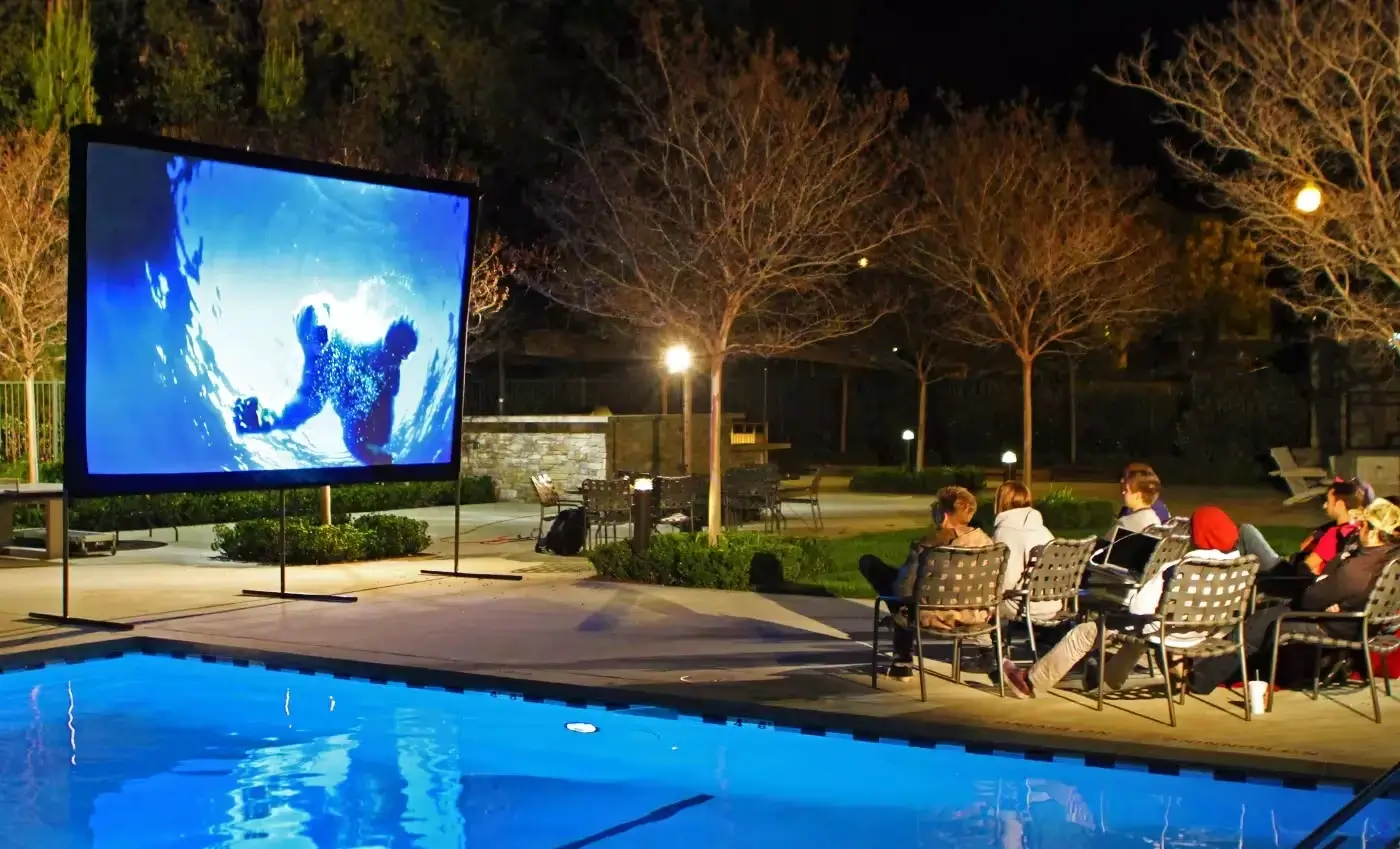You’ve probably asked yourself, “Are projector screens worth it?” Especially if you’re setting up a home theatre, hosting outdoor movie nights, or upgrading your office presentation space.
It’s easy to wonder if you really need one when a blank wall seems to do the job. But here’s the truth, if you care about picture quality, brightness, and getting the most from your projector, a proper screen isn’t just nice to have. It’s a must.
Let’s break it down clearly and simply.
What Makes a Projector Screen Different From a Wall?

A projector screen reflects light evenly, while a wall absorbs and scatters it. This means a screen gives you sharper contrast, truer colors, and a smoother picture, no matter what’s on.
Walls, even when painted white, aren’t designed for projection. Small bumps, cracks, and shadows change how light bounces off them. A projector screen, on the other hand, is built to give you consistent brightness from corner to corner.
It’s the same difference as watching a movie on your phone versus your TV. Sure, both show the same picture, but one clearly does it better.
Why So Many Canadians Ask This Question
If you’re in Canada, you already know how tricky it can be to find a projector setup that fits your space, weather, and budget.
Long winters mean more time indoors, and movie nights become a go to comfort. But dim, uneven visuals can ruin that cozy vibe. Whether you’re in Toronto, Vancouver, or Calgary, investing in the right screen can change your viewing experience, from “just okay” to cinema like clarity.
Most people asking “are projector screens worth it?” are trying to save money or simplify their setup. That’s fair. But once you see how much difference a proper screen makes, the cost feels small compared to what you get.
The Science Behind the Screen
Projector screens are engineered with special materials that control light reflection.
Unlike walls that absorb light, screens bounce it back toward the audience. Some have coatings that help with color accuracy or viewing angles, especially helpful in bright rooms.
For example, Boss Projector Screens use layered surfaces designed to reduce glare while keeping colors rich. That means your movie looks just as good at 2 PM as it does at 9 PM.
Think of it like this: a painter needs the right canvas. The same goes for your projector.
Are Projector Screens Worth It for Home Use?
Yes, they are. Especially if you want consistent picture quality and a real cinema experience.
For home theatres, the difference is immediate. Blacks look deeper, whites look brighter, and everything in between feels balanced. It’s what makes the movie come alive.
A lot of Canadian homes use multi purpose rooms for entertainment. The screen can roll up, fold, or even hide away, saving space. Portable screens, like the ones Boss Projector offers, are perfect for condos or smaller homes.
It’s not about spending more, it’s about getting more from what you already have.
What About Outdoor Use?

Outdoor projection in Canada comes with a few extra challenges, temperature changes, wind, and uneven surfaces.
A proper projector screen handles these better than any wall or sheet.
Boss outdoor screens are designed for quick setup and durability. Whether you’re hosting a backyard movie night in Edmonton or a camping trip near Banff, you’ll want something sturdy, lightweight, and easy to clean.
A wall or sheet won’t survive a gust of wind, but a screen built for the outdoors will stand its ground.
Do Projector Screens Improve Brightness and Color?
Yes, because they reflect light evenly.
Brightness depends on two things, your projector’s lumens and the screen’s gain (its reflective ability). A screen with a gain of 1.0 reflects light evenly, while higher gain screens can make images appear even brighter.
Walls tend to dull the image and distort colors. A true screen keeps reds warm, blues deep, and greens natural.
If you’ve ever watched a hockey game on a wall and thought, “Why does the ice look grey?”, that’s why.
The Cost Factor: Are Projector Screens Worth the Price?
Yes, because you get long-term value and better performance.
While a basic screen might cost a bit upfront, it protects your investment in your projector. You don’t need to push your projector to max brightness (which shortens lamp life) just to get a clear image.
Screens also last years. Many Boss Projector Screens come with durable materials that resist wear, stains, and wrinkles.
So when you add it up, longer projector life, clearer image, and better viewing, the value speaks for itself.
Common Myths About Projector Screens
Myth #1: A white wall works the same.
No, it doesn’t. Walls have texture and absorb light. Screens are smooth and reflective.
Myth #2: They’re expensive.
Not anymore. With brands like Boss, you can get high-quality screens for a fraction of what they used to cost.
Myth #3: You only need one for fancy setups.
Even casual viewers see the difference immediately, sharper detail, balanced brightness, and a more comfortable viewing experience.
How Boss Projector Makes It Simple for Canadians
When I first tried Boss Projector, I wanted something reliable and affordable. What I found was a brand that understands what Canadians actually need, screens that handle cold basements, bright rooms, and small spaces.
Boss Projectors are designed with simplicity in mind. Easy setup, lightweight frames, and screens that deliver consistent quality. Whether you’re watching a movie with your family or presenting in the office, you get a clear, balanced image every time.
And with local support and shipping across Canada, getting one isn’t a hassle. You can order online, set it up in minutes, and start watching right away.
How to Choose the Right Screen Size
Match your screen size to your room and viewing distance.
If your room is small, a 100 inch screen might be too large. Measure the space and use the “1.5 times rule”, the ideal viewing distance should be about 1.5 times the width of your screen.
For example, if your screen is 80 inches wide, sit about 10 feet away for the best experience.
Boss offers several sizes, from compact pull down screens to large fixed-frame ones. There’s something for every room and setup.
So, Are Projector Screens Worth It?
Yes, for anyone who values clear, balanced, and vibrant visuals.
From home theatres to classrooms and outdoor movie nights, a projector screen gives your setup the quality it deserves. It’s not about luxury, it’s about getting the best out of what you already own.
A wall might work in a pinch, but once you experience a true projection surface, you’ll never go back.
If you’re in Canada and thinking about upgrading your viewing setup, take a look at Boss Projector Screens. They’re practical, built to last, and make every movie night or presentation feel like the real deal.
Frequently Asked Questions
Yes, even small rooms benefit from a projector screen. The screen helps control brightness and contrast, giving you a clearer image even in tight spaces. Many compact options, like Boss pull-down or portable screens, are made for condos and small home theatres in Canada.
Absolutely, but choose a screen built for outdoor use. Outdoor projector screens are made from durable, weather-resistant materials that hold up against wind and temperature changes. Boss outdoor screens are easy to set up and perfect for summer movie nights or camping trips.
Yes, because they reflect light better than walls. A projector screen is designed to distribute light evenly, improving brightness and colour accuracy. Even budget projectors look sharper and more vibrant when paired with the right screen.
Most high quality screens last for years. Boss Projector Screens, for example, are built from tough, wrinkle free materials that resist fading and stains. With proper care, you can expect them to last 5–10 years or more.
It depends on your room size and viewing distance. The general rule is to sit about 1.5 times the width of your screen away. So if your screen is 100 inches wide, sit roughly 12–13 feet back for the best view.
Final Thought
A projector without a screen is like a guitar without strings, it’ll still make noise, but it won’t sound right.
So, if you’re still asking, “Are projector screens worth it?”, the answer’s simple: yes. Every time.
